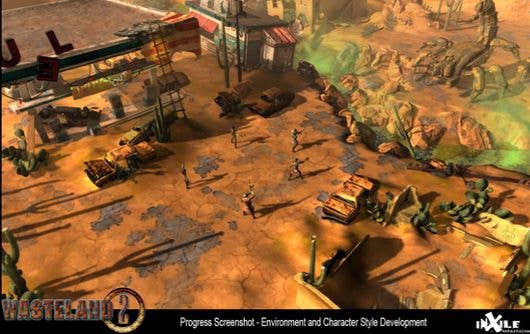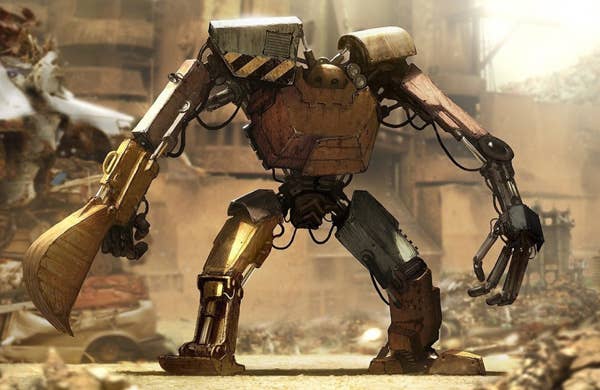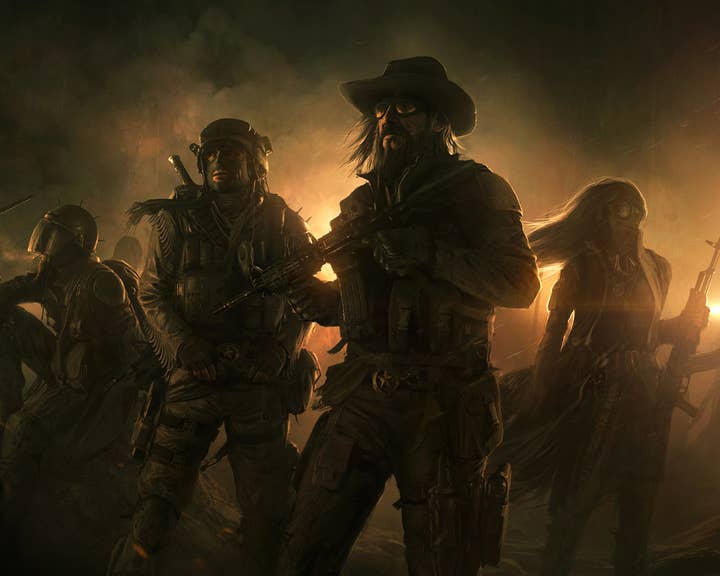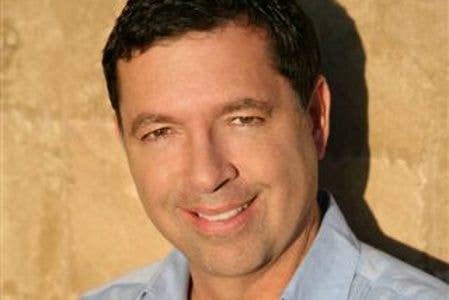Brian Fargo Interview: "Our definition of success is their failure"
The head of InXile Entertainment talks about publishers, Wasteland 2 development, and Kickstarter
The Wasteland 2 Kickstarter campaign, which generated about $3 million versus a goal of $900,000, helped boost the excitement created by Double Fine's groundbreaking Kickstarter campaign earlier in the year. Brian Fargo, longtime game developer (founder of Interplay) and CEO of InXile Entertainment, has been trying for years to make a sequel to the beloved Wasteland RPG, and Kickstarter finally made it possible. Now the project is deep into development, and Fargo shared some thoughts with GamesIndustry International about the process, traditional publishers, and Kickstarter.

Development on Wasteland 2 is moving rapidly, with multiple writers (including Chris Avellone, Michael Stackpole and Liz Danforth) creating scenarios. "The story now is 900 pages long," said Fargo. How does that compare to the original Wasteland? "It's much bigger," Fargo noted. "I'm doing one of the smaller maps, and I'm at 40 pages so far, and I'm not verbose. It's a lot of content. What if I rescue the kid? What if I don't rescue the kid? That's what everybody wants."
"I think it's going to be one of the densest, deepest RPGs ever."
The project is large in scope, with many moving parts. Fargo is pleased with the team that's assembled, but is the schedule on track? "It's still too early to tell," Fargo admitted. "I'm very happy with the team; we have three or four ace programmers and the designers are having trouble keeping up with them. The design is the biggest short-term concern. We've just signed up three other writers."
The overall result is that Fargo believes the project is achieving his goals. "I think it's going to be one of the densest, deepest RPGs ever; just the cause and effect is fantastic. Ultimately, that's what everybody wants. That's what made GTA so great, it's what made Sim City so great - when you do something it has an effect, and things hold together smartly."
One of the things that has helped the project forward is the quality of the tools available today, and the capabilities of the hardware. "It was difficult to program things in the first Wasteland, not like the tools today," Fargo noted. He illustrated this with a personal anecdote. "My son is 14, and he got some things up on the screen in a week that would have taken me two years." Fargo isn't concerned with actually coding the game. "Implementation is the easy part. The design, from a narrative perspective, is just a lot of if-then statements. So we can just write our hearts out and it will go in easily. It won't be like it was before, where every square was a program, and we had to worry about what we could fit on a disk."
With so many writers working on Wasteland 2, coordination is obviously a factor. It's helped along by the nature of the world, with towns that are separated by (of course) wastelands, making each one its own world, effectively. Fargo likens it to Star Trek, where each episode takes place on a different world. Still, there are threads that connect these separate stories together, and Fargo explains how it works. "I'll go through my map with the whole group and tell them what things I want to affect other things outside of my story," said Fargo. "I'll purposefully leave some hooks open so we can talk to the other maps. As we talk through each other's maps, we make it a symbiotic task. It requires a hell of a lot of coordination, which is my task."
"You'll find with these Kickstarter projects, our definition of success is their failure."
Fargo is a big believer in Kickstarter and the possibilities that it offers. His mantra is "Kickstarter's success driven by people's frustration with publishers." Fargo brought up the recent smash success of the Ouya console on Kickstarter. "I'm one of the original investors, and one of the strategic advisors on Ouya. It's been unbelievable. I knew it was good, but it far exceeded our expectations. It's always the gamers that drive this stuff. A lot of gamers are frustrated with Microsoft, because games almost come behind films and all this other stuff." He sees Ouya's success as a reflection on the impatience of fans for new hardware and new game experiences that the traditional publishers just haven't been providing.
Kickstarter has issues, though. Jordan Weisman of Hare-Brained Schemes, which is working on their Shadowrun game (successfully Kickstarter funded), is concerned that there will be some flameouts with Kickstarters, and that may negatively affect people's perceptions of Kickstarter, particularly because there's such a time gap between the end of the Kickstarter campaign and the delivery of the game. Fargo disagrees that Kickstarter will be blamed. "Of course there will be flameouts," he notes. "That's why there's even more pressure for me to deliver so that Tim [Schafer] and I can be high-profile successes. If we fall on our swords, it's going to be a real problem. That said, I feel good about my relationship with the fans, and we won't allow it to happen."

Fargo points to his own experiences with Kickstarter. "Thinking about it intellectually, honestly, I've invested in 12 or 15 Kickstarter projects. If three were to go sideways, or four, would I not invest any more? It wouldn't stop me. I think if all twelve went sideways, I'd be the first to admit, 'This is getting ridiculous.' That's not going to happen. If three or four fail, that doesn't mean I won't help some other guy's dream. We love helping the little guy out - it's just in our nature."
While Kickstarter has worked well for some high-profile projects, that doesn't mean that anything can walk up and get money. If anything, Fargo believes that success of high-profile projects has made it more difficult. "The bar is higher for what you need to do to resonate. It's harder to get publicity just because you're a Kickstarter," Fargo noted.
What about new designers and developers, ones that don't already have a fans base? "They gotta pay their dues, not go for those high numbers," said Fargo. "Kickstarter can't be the jumpstart of paying your dues, that's not where it's useful. I have a friend whose sons did a Kickstarter, but they had a game, a hardcore PC game, up and running, you could play it. They raised about $100,000 for it, and it was perfect for them. They proved that they could do something really cool, but it needed finish and polish, and the money could provide that."
Wasteland 2 is an order of magnitude less expensive than some RPGs, yet in some ways it may be a deeper experience. Will Wasteland 2 get publishers thinking that you don't need to do RPGs on the scale that they're used to? "You'd think yes, if we sold a million copies they might re-look at the category and try to do something differently," said Fargo. "On the other hand, they get locked into 'Can it be a billion-dollar franchise?' You'll find with these Kickstarter projects, our definition of success is their failure. I might sell a half a million units and go, 'This is fantastic! We just made a bunch of money and we get to make RPGs for another decade! High-five!' For them, a half million units... not so much."
"The ironic part is that all of these publishers, almost without exception, all of their billion-dollar franchises weren't forecasted as such. Tomb Raider, Grand Theft Auto, Tony Hawk, Call of Duty... they didn't start off that way. Probably Skylanders is the only one that was expected to be a billion dollar franchise."
"One might argue that Kickstarter is a focus test."
Kickstarter is as much of a product development and marketing tool as it is a fundraising tool, in Fargo's view. "One might argue that Kickstarter is a focus test. I'm constantly asked about Bard's Tale, a classic Bard's Tale. We'll look at that later on, but we are focused on Wasteland 2 right now," he said. The relationship that's been created with fans via Kickstarter is valuable to Fargo. "I vet everything with my fans right now," he said. "For instance, we planned to offer a special skill for the game at one of the reward levels. The fans went crazy; they said 'do not give us anything that will change the game balance.' What Wasteland 2 shows to me is that people want an emphasis on design, not on graphics. We asked them if we got more money, what would they want to see? More graphics, more audio? Every time, the fans said they wanted more game play, not more glitz."

Have there been any surprises in the Wasteland 2 project so far? "I think most of the surprises happened during the Kickstarter campaign, the amount of help that people were willing to give us for free," said Fargo.
Fargo also created the Kicking it Forward initiative for companies offering Kickstarter projects, encouraging them to use part of the profits (not the funding) they get as a result of a successful Kickstarter project to support other Kickstarter projects. So far, it's been a popular initiative. "80 projects have successfully funded and agreed to share their profits, so far," Fargo said. "If the average on those projects was at least $60,000 or $70,000, there's some half a million dollars going back into the ecosystem."
We'll check in again later in the project to see how it's progressing.

